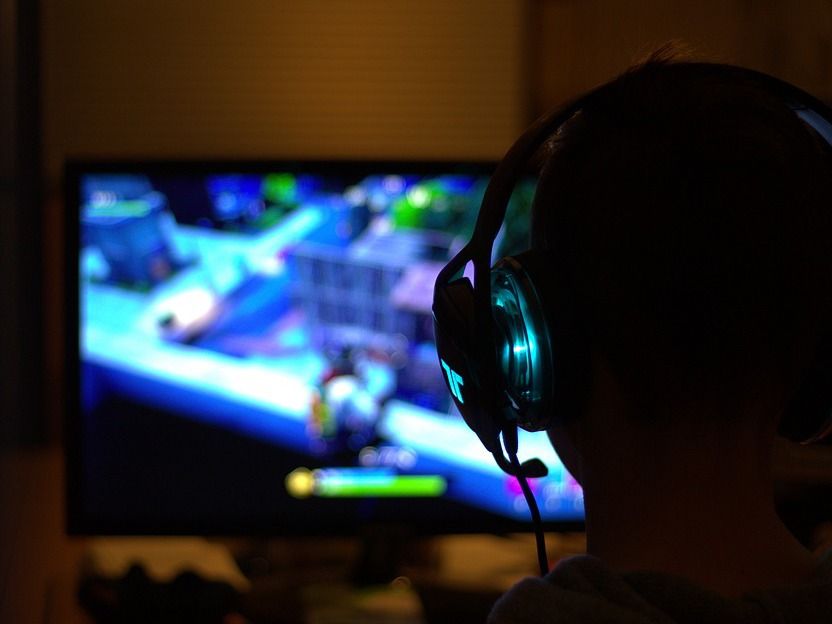Harmless computer gaming or already a health risk?
First psychological test developed to understand excessive gaming behaviour that can lead to 'gaming disorder'
The World Health Organisation (WHO) has just recognised gaming disorder as a new type of mental illness associated with extreme cases of uncontrolled gaming behaviour. The official inclusion of 'gaming disorder' and its definition in the WHO disease catalogue offers new possibilities to study the health and psychosocial effects of individuals who adopt an excessive behaviour when playing games. Researchers led by Dr. Halley Pontes of University of Tasmania (Australia) and Professor Christian Montag of Ulm University (Germany) have now developed the worldwide first psychological test for gaming disorder and conducted a trial with a random group of over 550 students from Great Britain and China.

Symbolic image
RPF70, pixabay.com, CC0
Parallel to their publication in the journal 'International Journal of Mental Health and Addiction' the researchers are also making their 'Gaming Disorder Test' available to the public on the internet. The online platform not only provide study participants with feedback on their video game behaviour in comparison to the rest of the population: With their participation they can also support one of the largest studies to date on gaming disorder as defined by the WHO.
Anyone who can no longer control their gaming behaviour, prioritises computer games over other activities and does not change this behaviour despite negative consequences could be suffering from gaming disorder according to the WHO definition. A few months ago, the World Health Organization included the condition 'gaming disorder' in the 11th edition of its disease catalogue 'International Classification of Diseases' (ICD-11) and just now the catalogue has officially been ratified. As per the WHO definition, this pattern of behaviour must have been evident for a minimum of 12 months and resulted in significant impairment in family life, education or work performance in order to meet the criteria.
In 2013, the related condition 'internet gaming disorder' was included as a 'condition for further study' in the appendix of the Diagnostic and Statistical Manual of Mental Disorders (DSM-5) of the American Psychiatric Association. Due to the differences in diagnostic criteria, however, the results of existing psychological tests for 'internet gaming disorder' are only partly transferable to the 'gaming disorder' as defined by the WHO. Researchers from Ulm, Cologne, London, Chinese universities and Australia have thus developed the world's first psychometric instrument to study and assess 'gaming disorder' on the basis of the WHO criteria.
The newly presented online questionnaire is based on WHO criteria and records gaming activities of the past twelve months up to the day of the survey on a scale of one to five (with 1 meaning 'never' and 5 'very often'). The purpose of the psychometric instrument is not so much to diagnose as to research the effects of excessive gaming. Therefore, study participants only receive feedback whether their results show a tendency towards 'gaming disorder'.
The researchers have already tried out their new 'Gaming Disorder Test' on a sample group of more than 550 Chinese and British students. 'Excessive video gaming is already a serious health risk in Asian countries and an emerging problem in Europe. In order to conduct large international studies, we designed the new instrument in a cross-cultural way and tested it in China and Great Britain,' explains Christian Montag, Heisenberg professor and head of the Department of Molecular Psychology at Ulm University.
The sample group included 236 young Chinese students from a university in Beijing and 324 British students from Greater London and the East Midlands. The average age was 23 years. Not having played any video games in the last twelve months automatically disqualified from participation in the online survey.
Upon completion of the survey the researchers used complex statistical procedures to assess whether the instrument is suited to measure gaming disorder ('validity') and whether the construct measurements are reliable ('reliability').
They were also able to draw initial conclusions about the gaming behaviour of the surveyed Chinese and British students. One such finding was that the prevalence of gaming disorder as per WHO criteria did not differ significantly between the two national groups. On average, the students stated that they play 12 hours a week. They spend almost half of this time (46%) on weekends alone in front of a computer or other mobile devices. A total of 36 participants (6.4 %) reported major problems in everyday life due to their gaming behaviour and could therefore fulfil the WHO's diagnostic criteria. The researchers are happy with the performance of the instrument during the test run: 'The Gaming Disorder Test seems suitable to assess the prevalence and, in combination with other questionnaires, the effects of gaming disorder in large cross-cultural groups based on the proposed WHO criteria,' said Montag. Next, the new questionnaire will need to be validated on patient samples.
The research group is currently planning the largest study to date on gaming disorder with possibly thousands of participants: The Gaming Disorder Test is now available online in German and English to all who are interested. Beyond other platforms, the scientists also seek to recruit further test participants via ESL, the largest esports company, with close ties to the gaming community. Rodrigo Samwell, CMO at ESL, stresses that the esports company wants to contribute to responsible gaming, and that is why they are supporting this study to help individuals understand better their behaviours towards gaming. With this new study the research group aims to understand at which point gaming is becoming a (health) problem and what factors contribute to Gaming Disorder including sociodemographic variables, personality and motivations.




















































